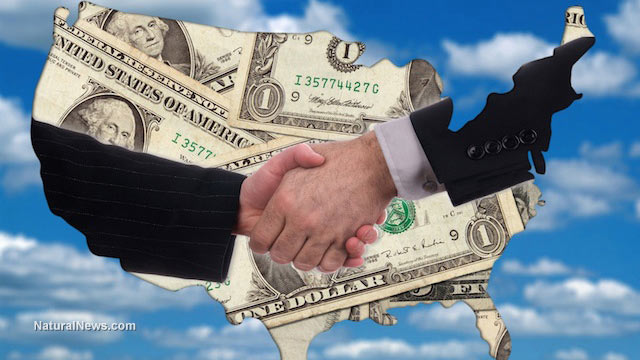Big banks have become huge criminal enterprises waging war against the people
Monday, March 23, 2015 by: J. D. Heyes
Tags: big banks, economic warfare, criminal enterprises

- TAKE IT DOWN Act advances in Congress amid free speech concerns
- Survival 101: Dangerous places to avoid when disaster strikes
- Hospital staffers sound alarm after 10 nurses were diagnosed with BRAIN TUMORS
- New studies ignite debate: Fluoride linked to autism and ADHD, prompting calls for policy reassessment
- “Prepare Tribe: Prepare, Protect, Provide” on BrightU: How to build a disaster-proof shelter in the middle of nowhere
- DOJ and ATF kill Biden’s “Zero Tolerance” firearms dealer policy
- Barley: A nutrient-dense ancient grain with modern benefits
- Sen. Ron Johnson accuses CDC official in charge of COVID-19 injections of deleting records amid Congressional GOP scrutiny
- Federal appeals court authorizes DOGE access to Education, Treasury and OPM records
- Sovereign debt paradox: U.S.-China mutual holdings fuel geopolitical tensions
- Children’s Health Defense stands firm: Based on SCIENCE and personal experiences, the MMR vaccine is NEITHER SAFE nor EFFECTIVE
- Analysis: The coming economic collapse, a mass uprising and Trump's three secret weapons to halt the growing revolt
- Fauci is back in the limelight, and he’s busy promoting a future COVID or FLU pandemic
- Aerosolized bioweapons? Strange “diploid biomasses” falling out of the sky in Florida captured under the microscope
- Widespread social and economic unrest: Steve Quayle issues urgent financial warning of imminent asset collapse in new interview with Mike Adams
- Tulsi Gabbard leads charge against the Biden regime’s global censorship of the 'Disinformation Dozen'
- Mike Adams releases country western hit single: Goin’ Back in Time is Comin’ Home
- The ancient superfood revival: Discovering the healing power of Job’s tears
- Fauci is back in the limelight, and he’s busy promoting a future COVID or FLU pandemic
- Tulsi Gabbard leads charge against the Biden regime’s global censorship of the 'Disinformation Dozen'
- Aerosolized bioweapons? Strange “diploid biomasses” falling out of the sky in Florida captured under the microscope
- Analysis: The coming economic collapse, a mass uprising and Trump's three secret weapons to halt the growing revolt
- Kiss Your Genetic Privacy Good-Bye! 23andMe Gets Green Light to Sell Your Intimate Genetic Details to Anyone They Want
- Widespread social and economic unrest: Steve Quayle issues urgent financial warning of imminent asset collapse in new interview with Mike Adams
- U.S. lawmakers investigate Meta over alleged China collaboration
- Mike Adams releases country western hit single: Goin’ Back in Time is Comin’ Home
- Chemtrails unveiled: How the CIA and Big Business are manipulating the weather for profit
- Curcumin’s ancient healing power supercharges muscle recovery, and its effects are compounded with anti-inflammatory foods and supplements
- Tulsi Gabbard takes aim at censorship: Justice for the ‘Disinformation Dozen’
- China’s counter-tariff strategies: A new chapter in the U.S.-China trade war
- CLOT SHOT PLANDEMIC UNFOLDING: Fibrous, rubbery clots caused by covid injections have prion-like seeding activity
- Israeli lobbyists boast of controlling US national security policy in leaked AIPAC audio
- European Court of Justice: Healthcare professionals who promoted or administered COVID-19 vaccines are CRIMINALLY LIABLE for any harm caused
- Defunding DEADLY mRNA jabs: Government funding for mRNA technology being scrutinized and sidelined until proven "safe and effective" for real
- DEATH by VACCINE or face PRISON time: Canadian Freedom Convoy leaders CONVICTED for protesting forced vaccination during the Covid Plandemic
- U.S. approves new Russian ambassador as diplomatic thaw continues
- Newly released JFK files reveal Pentagon's role in creating Lyme disease and covid in the same lab
- Analysis: The coming economic collapse, a mass uprising and Trump's three secret weapons to halt the growing revolt
- Mike Adams releases country western hit single: Goin’ Back in Time is Comin’ Home
- Aerosolized bioweapons? Strange “diploid biomasses” falling out of the sky in Florida captured under the microscope
- Kiss Your Genetic Privacy Good-Bye! 23andMe Gets Green Light to Sell Your Intimate Genetic Details to Anyone They Want
- European Court of Justice: Healthcare professionals who promoted or administered COVID-19 vaccines are CRIMINALLY LIABLE for any harm caused
- Federal employees whine over DOGE's new directive requiring them to do a 5-point summary of weekly accomplishments
- Dr. Mike Yeadon releases 15-minute testimony - WATCH - about genocidal intent of COVID “vaccines”
- The Health Ranger releases “Vaccine Zombie” song and music video, using AI-animated zombies for the music video
- U.S. approves new Russian ambassador as diplomatic thaw continues
- Government waste exposed: Hegseth supports Musk’s demand for accountability from federal workers
- Trump reverses course on Gaza plan, says “nobody is expelling Palestinians”
- Now you can HEAR chemistry: Health Ranger translates molecules into music in stunning video demonstration that will blow your mind (and your ears)
- 5 Simple steps to boost your brainpower: How to strengthen executive function in a distracted world
- EPA advisor admits the agency is funneling billions to climate groups ahead of Trump’s return to White House
- A lack of integrity in Academia: Harvard professor found GUILTY of fraudulent research to promote CRT theory
- Rep. Nancy Mace introduces bill to ban biological males from female facilities on federal property
- Survival 101: Effective EMF blocking techniques
- Red Cross issues warning to stop blood plasma donations from vaccinated people
- Scientists confirm: GENIUS brain function can be spontaneously unleashed in humans without any apparent cause
- EPA advisor admits the agency is funneling billions to climate groups ahead of Trump’s return to White House
- HYSSOP: What research reveals about the health benefits of this ancient holy herb
- Two containers with completed ballots fall out of truck in Florida
- Newly released JFK files reveal Pentagon's role in creating Lyme disease and covid in the same lab
- Global leaders unite to clamp down on “misinformation” with UN-backed Cascais Declaration
- BREAKING: 2025 NDAA authorizes mandatory military draft of WOMEN across America… as Pentagon pursues global NUCLEAR war with both Russia and China at the same time
- Michael Yon warns of a ZIONIST TAKEOVER in Trump’s second administration
- Mike Adams releases country western hit single: Goin’ Back in Time is Comin’ Home
- Ozempic and Wegovy weight loss drugs are injectable LIZARD VENOM PEPTIDES that may unleash a devastating wave of organ failure… side effects align with symptoms of SNAKE BITES
- The Health Ranger releases “Vaccine Zombie” song and music video, using AI-animated zombies for the music video
- BOMBSHELL: DNA testing kits are a SCAM to develop ethnic-specific bioweapons
- Israeli soldiers accused of even more torture and abuse in the West Bank
- These 13 countries just signed an agreement to engineer a global FAMINE by destroying food supply
- NASA admits that climate change occurs because of changes in Earth’s solar orbit, and NOT because of SUVs and fossil fuels
- RFK Jr. clears key hurdle: Sen. Susan Collins backs controversial HHS nominee, signaling a new era for health policy
- Sermon 30: How Jesus reveals Caesar’s FAKE CURRENCY and FALSE AUTHORITY
In a recent interview with Bloomberg News, Niels Storm Stenbaek, chief economist at the Danish Bankers Association, said this: "Banks don't have a need for deposits, and the demand for loans by households and firms is weak."
As noted over at Washington's Blog, that is a very odd statement, because don't banks exist as receptors of money (as in, savings and checking accounts)? And aren't banks in the business of making loans (because the interest charged on loans is primarily how a bank is supposed to make money)?
Not according to Stenbaek. So if banks no longer exist to make loans and serve as holders of your money, what are they doing?
The fact is, banks -- big banks, especially -- are behaving less and less like banks. Ever since the Great Recession bailed many U.S.-based mega-banks out with your money, the Federal Reserve's QE -- quantitative easing -- program has poured trillions of artificially created dollars into the world's biggest financial institutions, and it's why banking profits are through the roof, despite the fact that, you know, they don't make many loans and they're not worried about deposits.
Inflation (for government) is a good thing
The trend of decreasing loans and de-emphasizing deposits began at the supposed end of the Great Recession. In 2010, USA Today reported:
Banks that received federal assistance during the financial crisis reduced lending more aggressively and gave bigger pay raises to employees than institutions that didn't get aid....
For the period ending Sept. 30, 2009, lending fell by 9.1 percent, the paper said.
More than five years later, the big banks have amassed a treasure of more than $1.8 trillion, thanks to the Fed's QE program, so their bottom lines look good -- but they are still not lending like they should.
Maybe that's a good thing, though. As noted by The Economic Collapse Blog, pouring a tsunami of cash into the economy could cause massive inflation of the sort that the Fed and all the financial geniuses on Wall Street say they want. As reported by the Wall St. Cheat Sheet a year ago:
Government officials and central bankers will sometimes make statements to the effect that a little inflation is a good thing and that deflation needs to be avoided at all costs. From the perspective of an individual, deflation would actually be a good thing. Wouldn't it be great if the prices of things we want to buy -- cars, houses, clothes, stocks, etc. -- went down in price?
Yet from the government's perspective, just the opposite is true: Inflation is a good thing. There are two reasons for this.
What a mess
-- The U.S. government is highly indebted, to the tune of more than $18 trillion (officially), or more than 100 percent of annual gross domestic product. "Because of this, the government benefits if the value of this debt decreases, and this happens when there is inflation," Wall St. Cheat Sheet noted. "Inflation causes each dollar to be worth less, and so an indebted entity such as the U. S. government, which has, in effect, a negative amount of dollars, is better off if those dollars are worth less."
-- In the second place, inflation leads to a rise in prices and the government can then tax those nominal gains, even if those gains do nothing to boost consumer purchasing power.
One additional facet is at play here, or could be, and that is the issue of interest rates. One reason why the Fed has held interest rates down is because the federal government is so leveraged.
As noted by the Heritage Foundation, two-thirds of government spending is mandatory and, in 2013, 6 percent of the government's budget was spent on interest payments (and remember, the federal government runs serial deficits). If interest goes up, so do government interest payments, making the deficit even worse.
Uncle Sam has gotten himself into quite a financial mess. Eventually, however, the debt bomb will explode.
Sources:
http://www.bloomberg.com
http://www.washingtonsblog.com
http://usatoday30.usatoday.com
http://wallstcheatsheet.com
http://www.heritage.org
http://theeconomiccollapseblog.com
Big banks at FETCH.news
Get independent news alerts on natural cures, food lab tests, cannabis medicine, science, robotics, drones, privacy and more.
More news on big banks
Take Action: Support Natural News by linking to this article from your website
Permalink to this article:
Embed article link: (copy HTML code below):
Reprinting this article:
Non-commercial use OK, cite NaturalNews.com with clickable link.
Follow Natural News on Facebook, Twitter, Google Plus, and Pinterest
Science News & Studies
Medicine News and Information
Food News & Studies
Health News & Studies
Herbs News & Information
Pollution News & Studies
Cancer News & Studies
Climate News & Studies
Survival News & Information
Gear News & Information
News covering technology, stocks, hackers, and more



"Big Tech and mainstream media are constantly trying to silence the independent voices that dare to bring you the truth about toxic food ingredients, dangerous medications and the failed, fraudulent science of the profit-driven medical establishment.
Email is one of the best ways to make sure you stay informed, without the censorship of the tech giants (Google, Apple, Facebook, Twitter, YouTube, etc.). Stay informed and you'll even likely learn information that may help save your own life."
–The Health Ranger, Mike Adams













































